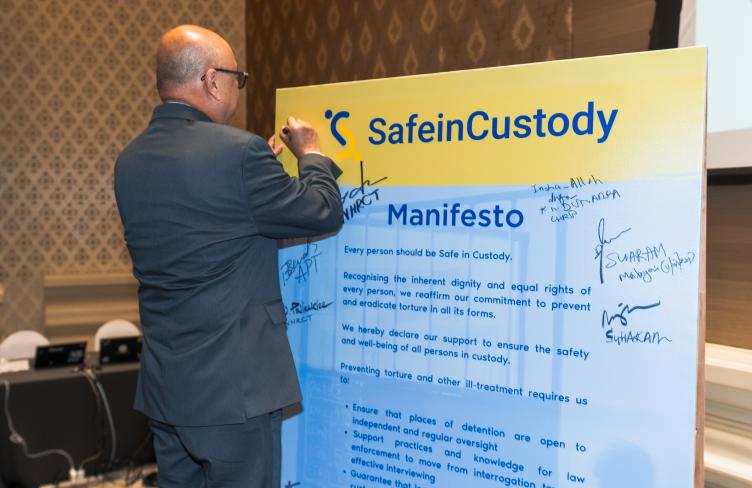
A new APT video series is promoting good practices implemented by courts in nine states across Brazil to ensure that custody hearings can be held in person during the COVID-19 pandemic.
Face-to-face custody hearings – when a person is brought before a judge within 24 hours of being detained – are a vital tool for identifying whether a person has experienced torture or violence on arrest or in the first hours of custody.
Last month, the APT joined with 66 organisations to co-sign an urgent appeal to the Inter-American Commission of Human Rights raising concerns about a resolution by Brazil’s National Justice Council authorising custody hearings by videoconference during COVID-19.
“It is so just important that custody hearings are held face-to-face at this time,” said Sylvia Dias, APT Senior Legal Adviser and Representative in Brazil.
The states of Rio de Janeiro, Mato Grosso do Sul, Roraima, Pará, Amapá, Sergipe, Goiás, Espírito Santo and the Federal District have all implemented COVID-safe protocols in their courts to allow custody hearings to be held in person.
Some of the common measures adopted include: mandatory temperature checks at the entrance to the courthouse; distributing protective face masks; providing hand sanitising gels; deep-cleaning courtrooms between hearings; and ensuring social distancing between all present.
“Our three-part video series clearly demonstrates that it is possible for courts to hold face-to-face custody hearings during COVID-19 in a way that is safe for everyone involved,” Ms Dias said. “We hope it will encourage courts in the other states of Brazil to implement similar measures and end the practice of holding custody hearings by videoconference.”
In the first video, Joel Hernández, President of the Inter-American Commission on Human Rights, emphasised the critical importance of face-to-face custody hearings to safeguard the rights of people in custody and, more broadly, as a process that can help reduce prison populations.
The videos document changes that courts have made to their physical spaces including: installing acrylic partitions between the tables of participants (Roraima, Espírito Santo, Sergipe and the Federal District); converting five old rooms into three larger courtrooms, with improved ventilation (Rio de Janeiro); and adapting one of the jury’s court plenaries as a space to hold custody hearings (Mato Grosso do Sul).
In Sergipe and Mato Grosso do Sul, detainees take part in an interview with a psychologist and a social worker team before the custody hearing, which includes procedures to identify possible health problems or COVID symptoms.
In addition, Judge Olivar Coneglian of the Mato Grosso do Sul Court of Justice, described in the second video the need to establish a new inter-institutional procedure for those arrested “in flagranti delicto” during the pandemic, covering all detainees from the time of their arrest to their possible release or transfer to the prison unit.
Notifications of ill-treatment and torture have increased across states that have resumed face-to-face hearings, based on testimonies from people held in detention.
In the third video, Judge Lana Leitão, coordinator of custody hearings in Roraima, describes the process that magistrates follow if there is a report of mistreatment. For example, the judge must ask specific questions about the abuse, document the report in detail and promptly refer the case for investigation by the appropriate authorities. A medical examination of the detainee must be ordered and, if required, medical care provided.
The State Court of Rio de Janeiro (TJRJ) reported that 5,997 face-to-face custody hearings were held at the Central Court of Custody of the Capital between 3 August and 31 December 2020, with 762 complaints of torture and ill-treatment referred for investigation. The TJRJ has also produced a video documenting the changes the court has made to ensure the safe resumption of face-to-face custody hearings during the pandemic.
Other useful resources include Guidelines developed by the State Court of the Federal District and biosafety protocols published by the State Court of Goiás.


